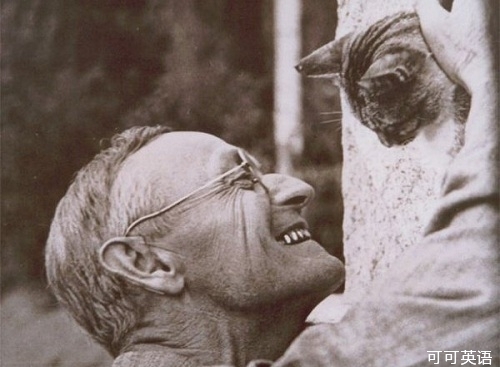(单词翻译:单击)
名著阅读
And Govinda mumbled a verse to himself, a verse from an Upanishad:
He who ponderingly, of a purified spirit, loses himself in the meditation of Atman, unexpressable by words is his blissfulness of his heart.
But Siddhartha remained silent. He thought about the words which Govinda had said to him and thought the words through to their end.
Yes, he thought, standing there with his head low, what would remain of all that which seemed to us to be holy? What remains? What can stand the test? And he shook his head.
At one time, when the two young men had lived among the Samanas for about three years and had shared their exercises, some news, a rumour, a myth reached them after being retold many times: A man had appeared, Gotama by name, the exalted one, the Buddha, he had overcome the suffering of the world in himself and had halted the cycle of rebirths. He was said to wander through the land, teaching, surrounded by disciples, without possession, without home, without a wife, in the yellow cloak of an ascetic, but with a cheerful brow, a man of bliss, and Brahmans and princes would bow down before him and would become his students.
This myth, this rumour, this legend resounded, its fragrants rose up, here and there; in the towns, the Brahmans spoke of it and in the forest, the Samanas; again and again, the name of Gotama, the Buddha reached the ears of the young men, with good and with bad talk, with praise and with defamation.
It was as if the plague had broken out in a country and news had been spreading around that in one or another place there was a man, a wise man, a knowledgeable one, whose word and breath was enough to heal everyone who had been infected with the pestilence, and as such news would go through the land and everyone would talk about it, many would believe, many would doubt, but many would get on their way as soon as possible, to seek the wise man, the helper, just like this this myth ran through the land, that fragrant myth of Gotama, the Buddha, the wise man of the family of Sakya. He possessed, so the believers said, the highest enlightenment, he remembered his previous lives, he had reached the nirvana and never returned into the cycle, was never again submerged in the murky river of physical forms. Many wonderful and unbelievable things were reported of him, he had performed miracles, had overcome the devil, had spoken to the gods. But his enemies and disbelievers said, this Gotama was a vain seducer, he would spent his days in luxury, scorned the offerings, was without learning, and knew neither exercises nor self-castigation.
The myth of Buddha sounded sweet. The scent of magic flowed from these reports. After all, the world was sick, life was hard to bear--and behold, here a source seemed to spring forth, here a messenger seemed to call out, comforting, mild, full of noble promises. Everywhere where the rumour of Buddha was heard, everywhere in the lands of India, the young men listened up, felt a longing, felt hope, and among the Brahmans' sons of the towns and villages every pilgrim and stranger was welcome, when he brought news of him, the exalted one, the Sakyamuni.
The myth had also reached the Samanas in the forest, and also Siddhartha, and also Govinda, slowly, drop by drop, every drop laden with hope, every drop laden with doubt. They rarely talked about it, because the oldest one of the Samanas did not like this myth. He had heard that this alleged Buddha used to be an ascetic before and had lived in the forest, but had then turned back to luxury and worldly pleasures, and he had no high opinion of this Gotama.
"Oh Siddhartha," Govinda spoke one day to his friend. "Today, I was in the village, and a Brahman invited me into his house, and in his house, there was the son of a Brahman from Magadha, who has seen the Buddha with his own eyes and has heard him teach. Verily, this made my chest ache when I breathed, and thought to myself: If only I would too, if only we both would too, Siddhartha and me, live to see the hour when we will hear the teachings from the mouth of this perfected man! Speak, friend, wouldn't we want to go there too and listen to the teachings from the Buddha's mouth?"
这时,戈文达喃喃地念了起来,那是《奥义书》里的两行话:
谁沉思默想,心灵净化,潜心于阿特曼,
他心中的幸福就难以用言语来表达。
可是,席特哈尔塔却默默不语。他仔细地思索戈文达对他说的话,从头到尾地琢磨这些话。
他低着头站在那儿,心想,是的,我们觉得神圣的一切还会剩下什么呢?有什么能留下来呢?有什么能经得住考验呢?他摇了摇头。后来,在这两个年轻人和沙门一起生活并苦修了将近三年时,通过各种渠道传来了一个消息,一个流言,一个传闻:有一个名叫戈塔马的人,是个高僧、活佛,他在自己身上克服了尘世的烦恼,终于使再生之轮停了焉炝 四处讲学,漫游全国,受信徒爱戴,没有产业,没有家园,没有妻室,身穿苦行僧的黄僧衣,但是他额头开朗愉快,是个得道之人,婆罗门和王公贵族在他面前都十分谦恭,愿意做他的弟子。
这个传闻,这个流言,这个说法,四处流传,沸沸场场,在城里有婆罗门讲,在森林里有沙门讲,活佛戈塔马的名字再三传到这两人年轻人耳中,有好坏也有坏话,有赞颂也有诽谤。
就好像瘟疫正在某个国家肆虐,这时忽然传出消息,有某一个人,一个贤人,一个行家,他的话语和气息就足以治好每一个受到瘟疫侵袭的人。这消息传遍了全国,人人都在谈论,好多人相信,好多人怀疑,还有好多人立即动身去寻访这个贤人和救星。就这样,全国都传遍了这个消息,这个出身于释迦牟尼家族的戈塔马活佛的美好传闻。信徒们都说,他已经掌握了最高的知识,他刻自己前世之事,他已经达到了涅PAN,永远不会再回到轮回之中,永远不会再陷入万物的浊流了。到处都流传着许多有关他的惊人的、不可思议的消息,说他创造了奇迹,制服了妖魔,曾经跟神圣对过话。但是,他的敌人和对头则说,这个戈塔马是个自命不凡的骗子,过着舒适的日子,忽视祭祀,没有学问,不懂 得苦修也不懂得清心寡欲。
关于活佛的传闻听起来十分悦耳,从这些说法中散发出迷人的馨香。这个世界出了毛病,生活简直让人难以忍受 可是你瞧,这里似乎涌出了一股清泉,似乎响起了一声使者的呼唤,令人欣慰而柔和,充满了高雅的承诺。关于活佛的传言到处传播,印度各地的年轻人都十分关注,感觉到渴求,感觉到希望。在城乡的婆罗门子弟当中,朝圣者和外来人都受到热烈的欢迎,只要他们能带来有关那位活佛的消息。
这传闻也传到了森林里的沙门这儿,传到了席特哈尔塔和戈文达耳中。它是缓慢地点滴地传来的,每一滴都难以置信,每一滴又难以置疑。在他们之间很少谈论这件事,因为那个老沙门不喜欢这个传闻。他听说,那个所谓的活佛以前 个苦行僧,在森林里生活过,可是后来又回头过上了舒适的生活,寻欢作乐,因此他很瞧不起那个戈塔马。
“哦,席特哈尔塔,”戈文达有一次对他的朋友说,“今天我到了村子里,一个婆罗门请我到他家,他家有个刚从马加达回来的婆罗门子弟。此人亲眼见过那位活佛,聆听过他的教诲。说真话,当时我激动得连喘气都感到胸口痛,我暗自想:但愿我,但愿我们俩, 席特哈尔塔和我,也能有机会聆听到那位完人的亲口哮诲!你说吧,朋友,咱们要不要也到那儿去,听活佛亲口讲经?”
背景阅读

本书简介:
古印度贵族青年悉达多英俊聪慧,拥有人们羡慕的一切。为了追求心灵的安宁,他孤身一人展开了求道之旅。他在舍卫城聆听佛陀乔答摩宣讲教义,在繁华的大城中结识了名妓伽摩拉,并成为一名富商。心灵与肉体的享受达到顶峰,却让他对自己厌倦、鄙弃到极点。在与伽摩拉最后一次欢爱之后,他抛弃了自己所有世俗的一切,来到那河边,想结束自己的生命。在那最绝望的一刹那,他突然听到了生命之河永恒的声音……经过几乎一生的追求,悉达多终于体验到万事万物的圆融统一,所有生命的不可摧毁的本性,并最终将自我融入了瞬间的永恒之中。
作者简介:
赫尔曼·黑塞(Hermann Hesse,1877.7.2-1962.8.9)德国作家。1923年46岁入瑞士籍。1946年获诺贝尔文学奖。1962年于瑞士家中去世。爱好音乐与绘画,是一位漂泊、孤独、隐逸的诗人。黑塞的诗有很多充满了浪漫气息,从他的最初诗集《浪漫之歌》的书名,也可以看出他深受德国浪漫主义诗人的影响,以致后来被人称为“德国浪漫派最后的一个骑士”。主要作品有《彼得·卡门青》、《荒原狼》、《东方之行》、《玻璃球游戏》等。
主要生平及创作
出生于德国西南部的小城卡尔夫的一个牧师家庭。自幼在浓重的宗教气氛中长大,1891年,他通过“邦试”,考入毛尔布隆神学校。由于不堪忍受经院教育的摧残,半年后逃离学校。这期间他游历许多城市,从事过多种职业。
在比较广泛地接受东西方文化熏陶之后,1904年,黑塞发表了长篇小说《彼得·卡门青特》,一举成名,从此成为专业作家。这一年他与玛丽结婚,移居巴登湖畔,埋头写作,1906年发表了长篇小说《在轮下》。这一时期的创作以浪漫主义诗歌、田园诗风格的抒情小说和流浪汉小说为主,作品洋溢着对童年和乡土的思念之情,充满对广大自然和人类的爱,同时也表现了青年人的精神苦闷与追求。
第一次世界大战后,黑塞的创作发生了明显的变化,他醉心于尼采哲学,求助于印度佛教和中国的老庄哲学,并对荣格的精神分析产生了深厚的兴趣。他试图从宗教、哲学和心理学方面探索人类精神解放的途径。这时期的长篇小说有《克努尔普》(1916)、《德米安》(1919)、《席特哈尔塔》(1922)、《荒原狼》(1927)和《纳尔齐斯与歌尔德蒙》(1930)等。这些书深受西方读者的喜爱,得到极高的评价,其中《荒原狼》曾轰动欧美,被托马斯·曼誉为德国的《尤利西斯》。
30年代后,法西斯在德国猖獗,黑塞对社会前途陷入深深的怀疑与绝望之中,但他仍不倦地从东西方宗教与哲学中寻求理想世界,《东方之行》(1932)、《玻璃球游戏》(1943)正是这一时期追求与探索的结晶。
黑塞被雨果·巴尔称为德国浪漫派最后一位骑士,这说明他在艺术上深受浪漫主义诗歌的影响。他热爱大自然,厌倦都市文明,作品多采用象征手法,文笔优美细腻;由于受精神分析影响,他的作品着重在精神领域里进行挖掘探索,无畏而诚实地剖析内心,因此他的小说具有心理的深度。1946年,"由于他的富于灵感的作品具有遒劲的气势和洞察力,也为崇高的人道主义理想和高尚风格提供一个范例",黑塞获诺贝尔文学奖。


